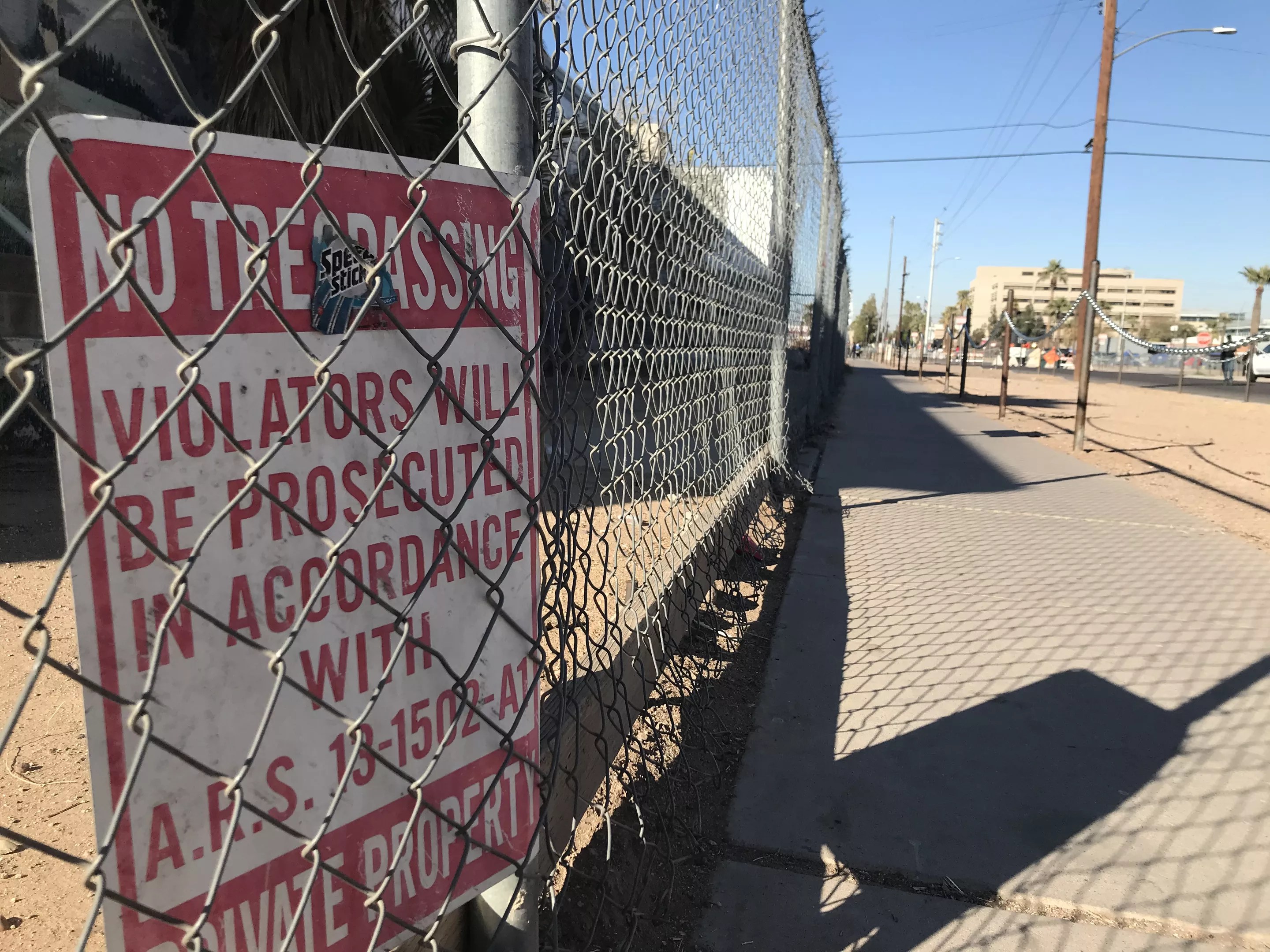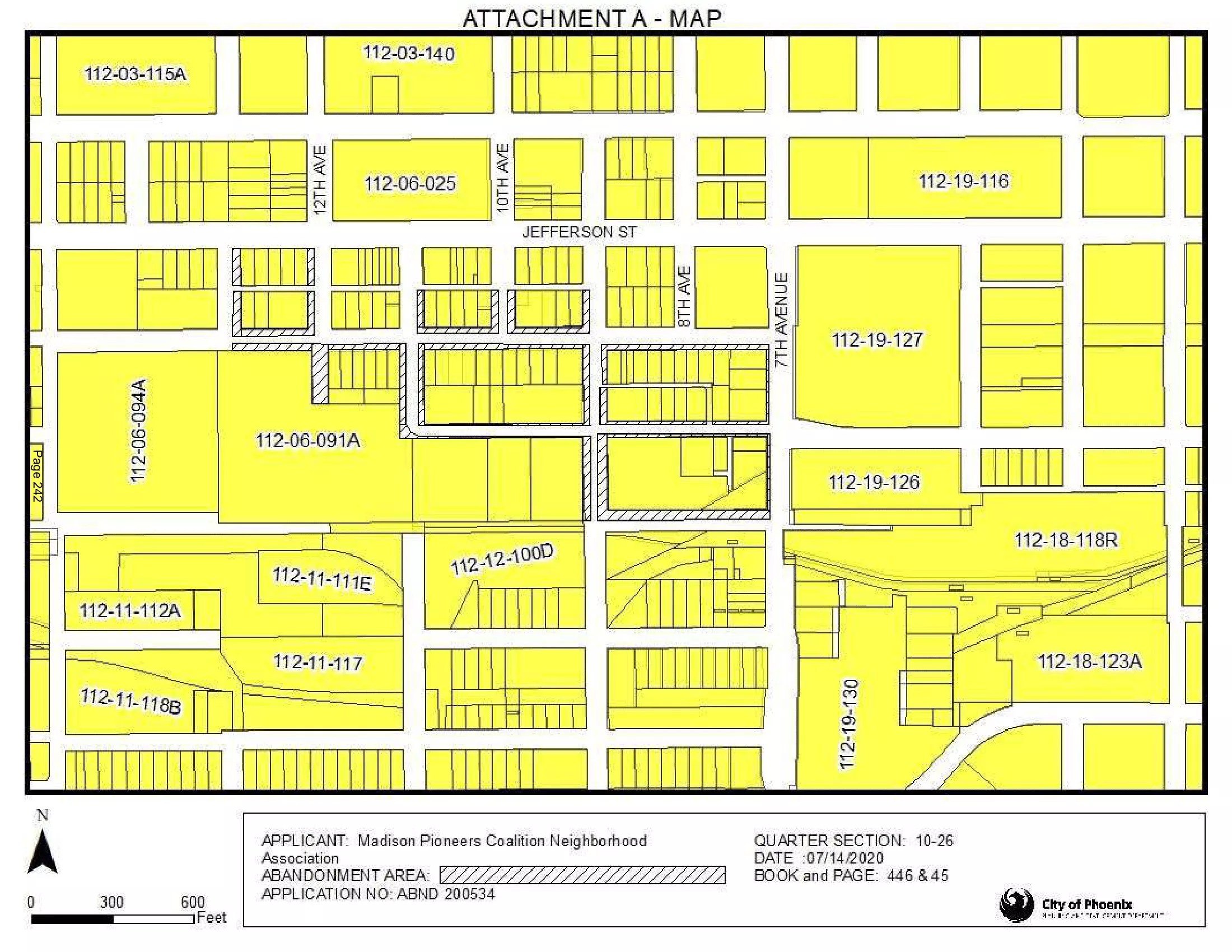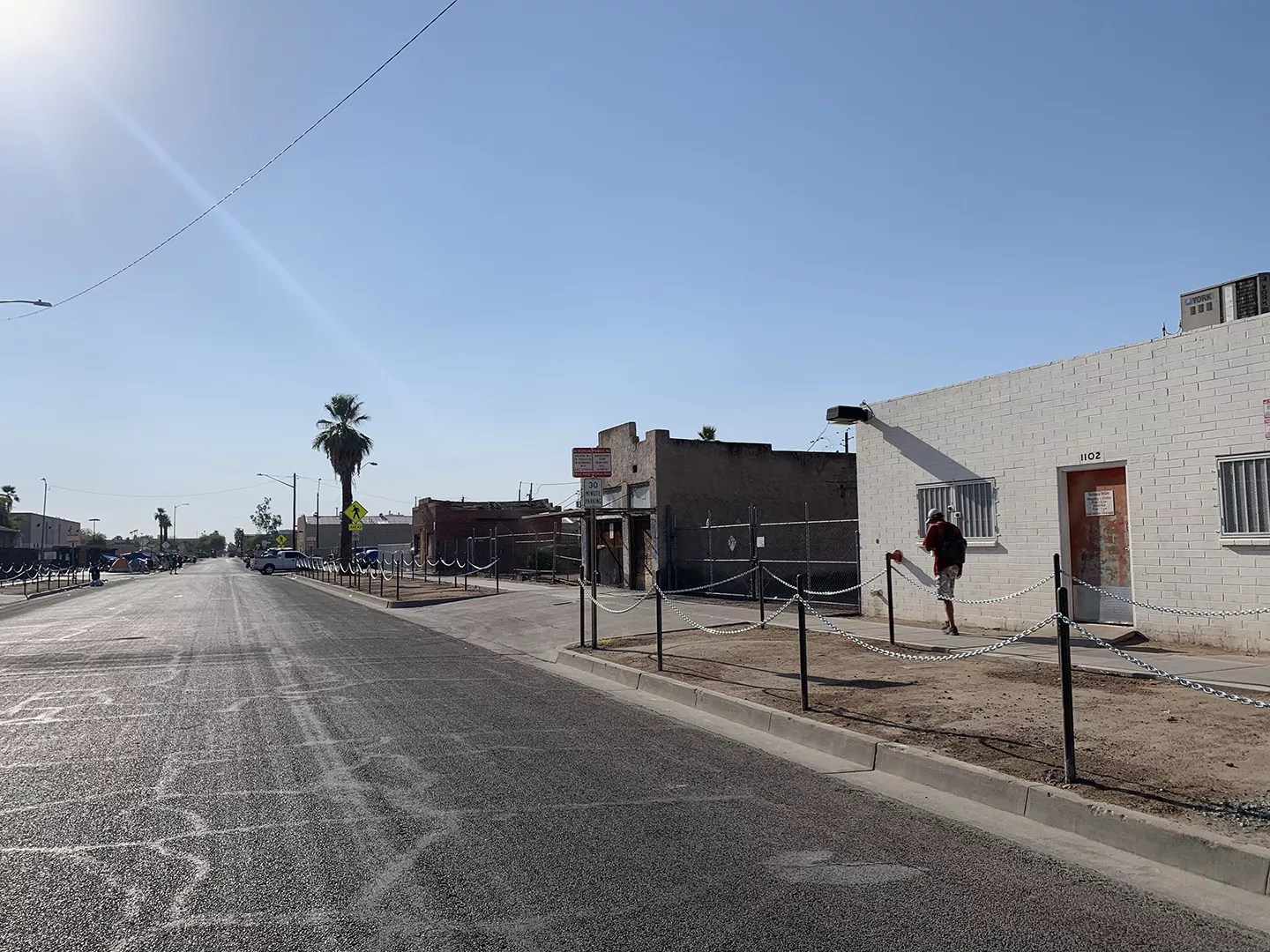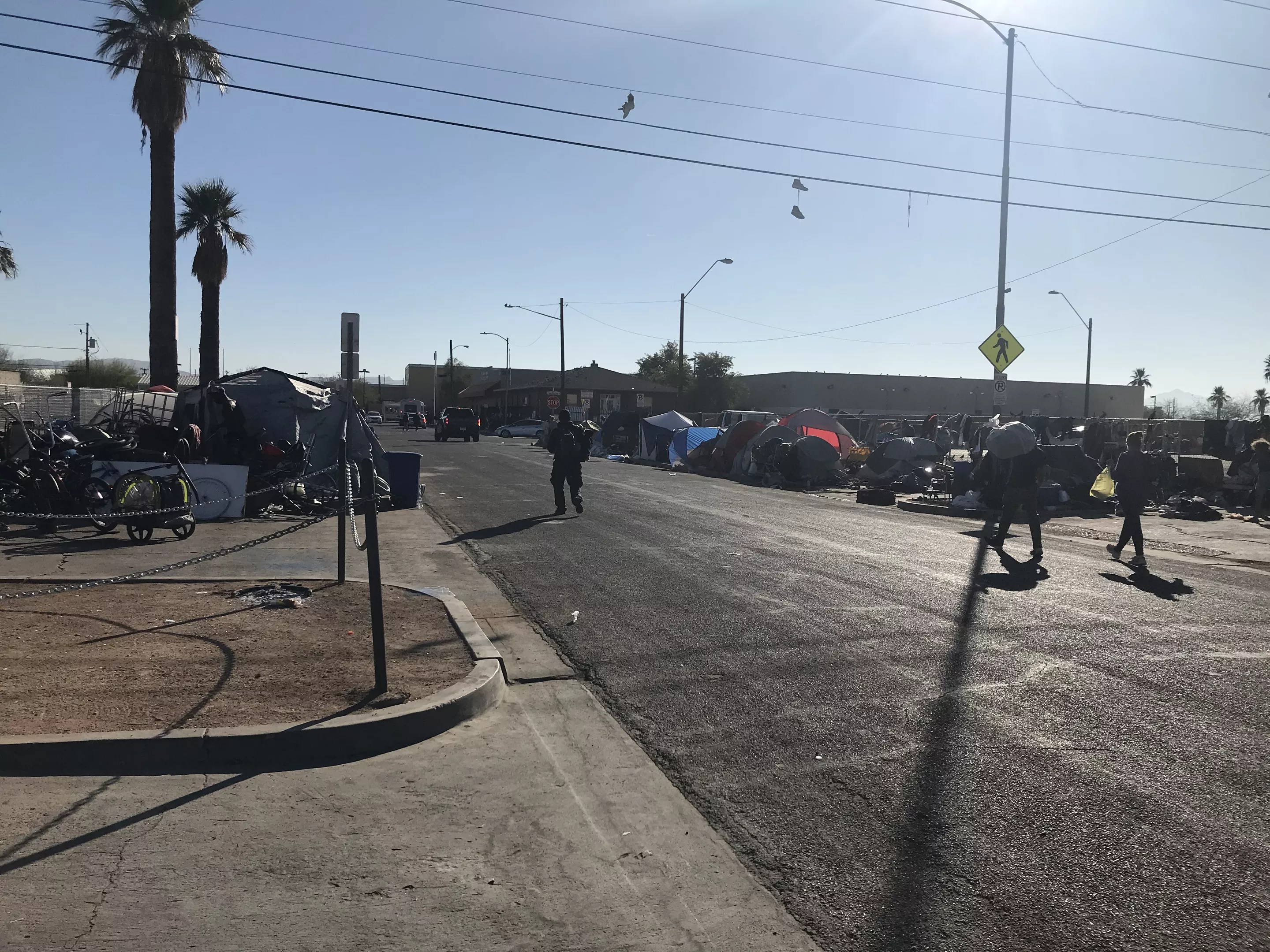
Erasmus Baxter

Audio By Carbonatix
A neighborhood group near Maricopa County’s central hub for homelessness services is asking the Phoenix City Council to take the unprecedented step of letting them privately own and manage several blocks worth of now-public sidewalks.
The group, known as Madison Pioneers Coalition, is made up of business owners and residents just west of downtown Phoenix in the area surrounding the Human Services Campus, a 13-acre one-stop-shop of services for people experiencing homelessness that also features the state’s largest emergency shelter.
Members have long complained about people camping on the dirt areas between the sidewalk and street around the campus, which they say drives crime, trash, public defecation, and drug use.
“I’m not an expert on this. I just know we need some help and we’re not getting it,” said the coalition’s president Angela Ojile.
Now, the group is asking for the city to surrender the public’s right to 28 segments that comprise over a mile of those strips, known as easements, and attached sidewalks – allowing ownership to revert to whichever property owners are adjacent to the segments.

The striped areas illustrate the proposed privatizations. The L-shaped block of property on the center-left is the Human Services Campus.
City of Phoenix
Group members say this would allow them to maintain the areas better than the city, and reduce crime. Others see it as an effort to prosecute or displace people currently living under the protection of a 2019 Ninth U.S. Circuit Court of Appeals ruling that allows camping on public property when shelters are full.
A city hearing officer denied the group’s request following a hearing in September, saying it was beyond the scope of the “abandonment” process they were applying under.
“Based upon testimony provided in the hearing, it is my opinion that the the primary motive for this application is to render the activities in the [right-of-way] criminal,” the officer wrote.
The coalition appealed and will get a second chance to make its case when the city council considers the appeal. It is scheduled to do so on February 3.
Community-activist-turned-councilmember Carlos Garcia has already signaled his opposition to the proposal, saying in an Instagram post that he believes the measure is intent on criminalizing people living outside, and that it’s contrary to the comprehensive homelessness plan recently passed by the council.
‘Creative Solutions’
The number of tents erected on the easements has declined dramatically since this spring, when the city -citing COVID-19 concerns – displaced most of the people living there and put up two-and-a-half miles of chain-and-post barriers around the easements. Many of the displaced people moved onto the unsheltered, fenced lots established by the county nearby while others dispersed around the city.
Currently, several dozen tents cluster in a one-block block radius near the entrance to the Human Services Campus and by the train tracks to the south – two of the few areas free of chains.
Back in September, during the hearing, supporters of the abandonment told the hearing officer tales of accumulating trash and excrement, presenting the situation as a severe nuisance. Supporters still argue that their proposal is the best way to deal with the remaining homeless campers .
Jordan Greenman, a former city of Phoenix urban planner hired by the group to advocate for the proposal, strenuously denied the proposal was a ploy to avoid the Ninth Circuit Court ruling.
“It’s not about criminalizing homelessness. It’s not about kicking people off properties,” said Greenman, who runs a land-use consulting firm while attending law school.

The city spent 9,000 erecting these poles and chains after displacing the people living there. Now, neighbors are seeking to have these areas privatized.
Courtesy of Lora Martens
He said the upcoming appeal before the City Council is a chance to work with the city to come up with “creative solutions” to the group’s concerns.
He suggested that one such solution is to remove the posts and chains – which Greenman called anti-homeless and inhumane – and instead work with an Arizona State University group to replace the bare dirt of the easements with lush landscaping in an attempt to deter crime.
Beyond that, however, Greenman could provide no other examples of how the move would address criminal activity, saying that would have to be determined in collaboration with the council.
Madison Pioneers Coalition president Ojile said in a separate interview that part of the proposal’s appeal is being able to disperse groups of people on sidewalks and crack down on criminal activity that residents believe is occurring in tents, but which police can’t prove.
Ojile claimed that property owners in the neighborhood are able to determine who the good people are and who is engaging in anti-social behavior.
She said people often defecate or use drugs in her driveway, but police are slow to respond. She believes if that area were privatized she could address criminal or nuisance behavior when police couldn’t.
Criminal activity may still occur, “but we would be able to say ‘Hey, you can’t do that!” Ojile said.
Concerns
Eric Tars, legal director of the Washington D.C.-based National Homelessness Law Center, believes that Phoenix could face litigation if it is clear that the goal of the transfer is a “legal fiction” to allow a clampdown on people living outside.
He’s currently the lead attorney on the 2019 case, known as Martin v. Boise, which prohibits criminal action against people for camping on public property when shelters are full. He told Phoenix New Times he’s seen other jurisdictions attempt to skirt the court’s ruling through privatizing public areas, although not in this specific manner.
“My first response is that it’s absurd that the city is spending its time and money developing this sort of ordinance and plan when instead they could be spending that time and energy developing programs that would actually help end homelessness in Phoenix,” he said.
Tars warned this would also increase the role police would play in arresting and jailing people for trespassing on the privatized land – at cost to taxpayers – and could lead to sanctions against people who don’t know whether a stretch of sidewalk is public or private.
“This is America, and at the end of the day we believe people should be able to move around in our communities freely,” he said.

Unattended possessions lie in front of a boarded up building near the Human Services Campus. Under the proposal, this area would be private property.
Erasmus Baxter
In addition to the legal issues, Phoenix’s departments of Street Transportation, Public Transit, and Planning all raised logistical concerns about the proposal, with Street Transportation recommending denial of the application.
Transit officials pointed out that there are area residents who rely on public transportation and are protected by federal civil rights law. Without access to sidewalks, commuters and other users would have to walk in the street to reach transit stops, causing safety and traffic-flow issues.
Greenman and some city officials believe the transit issue and several other questions could be addressed with a detailed list of additional agreements, including one securing access to sidewalks for people passing through.
But that still leaves two issues: trash cleanups and compensation to the city.
On the first point, transferring the ownership would mean that weekly clean-ups of trash and unattended belongings done by a city crew with heavy machinery would halt. That would leave it up to property owners to either do the work of the crew themselves or hire private workers.
On the second point, the hearing officer noted that the city is required to charge fair market value for the land. Greenman says the group is ready to pay, but he believes that the applicants would be providing a service to the city by taking on the maintenance of the areas, which should be factored into any deal.
An Unlikely Ally
Backing the proposal is an unlikely ally for the neighborhood group: the Human Services Campus. Under the proposal, the organization would also gain ownership of the sidewalks and easements adjacent to the campus.
A public relations consultant for the campus, Steve Carr, initially declined to comment on the proposal at all. After Greenman told New Times that the organization supports the proposal, Carr confirmed that was the case, but declined to comment further on how the campus would use its new authority over surrounding sidewalks if the proposal passes.
Agreement between Madison Pioneers and the Human Services Campus is not typical. The neighborhood group has been a bitter opponent of an application by the campus and nearby nonprofits to expand the number of shelter beds they can operate in their existing spaces.

Tents line the easements leading up to the Human Services Campus that don’t have chains on them. If the area was privatized, the people living in the tents on the left could be evicted at any time.
Erasmus Baxter
The service providers say the expanded beds will offer a place to go for the people sleeping outside that neighbors are worried about, and Greenman portrays the landscaping and privatization working in conjunction with the expanded beds to move people off the streets.
However, Greenman’s coalition clients are vehemently opposed to the expansion plan. Asked about the conflict between the vision he was pitching and the one his clients were working towards, Greenman said he couldn’t comment and his job was to convince the city council that the abandonment was the best solution.
If privatizing the sidewalks does cause an exodus of the homeless people living in the area, the result would be contrary to Centers for Disease Control and Prevention guidelines against dispersing encampments of unsheltered people during the pandemic.
For her part, Ojile says she’s unconcerned about the people living outside the Human Services Campus being dispersed into other neighborhoods. She doesn’t believe many people near the campus are actually accessing services.
The Big Picture
Ojile and Greenman both said they heard from coalition member John Westerdale that the idea for the abandonment came from a member of Mayor Kate Gallego’s office. Westerdale also attributed the idea to the mayor’s office during statements he made at the September hearing.
However, mayor’s office spokesperson Jeanine L’Ecuyer said she had no idea what Westerdale was referring to, adding that the mayor had yet to take a position on the proposal. Westerdale did not respond to repeated calls and text messages from New Times.
David King, an ASU urban planning professor, said the abandonment process is usually used to remove odd pieces of sidewalk or road that are no longer needed. He said he couldn’t find any examples of the abandonment process being used to privatize lengths of regularly used sidewalk.
“That being said, there’s a lot of examples across the country of the criminalization of homelessness,” he said, adding that sidewalks have always been a contested space.
Some private developments, like Sun City, have entirely private sidewalks, and people in richer areas nationally have sought to privatize their streets. However, when public spaces are privatized, enforcement of who’s allowed to be there is often more stringent, he said.
“We can expect there would be problems associated with race and problems associated with other types of discrimination going on,” he said of policing privatized public spaces.
One possible alternate option: a model like the Downtown Tempe Authority, where private staff patrol Mill Avenue and work to keep the sidewalks unobstructed by people.
“So the public space still exists but they have private efforts on top of that,” King said. “…Unless we deal with the core problem [of homelessness], issues like this abandonment and other things like that are going to keep coming up. And that’s treating symptom not causes.”